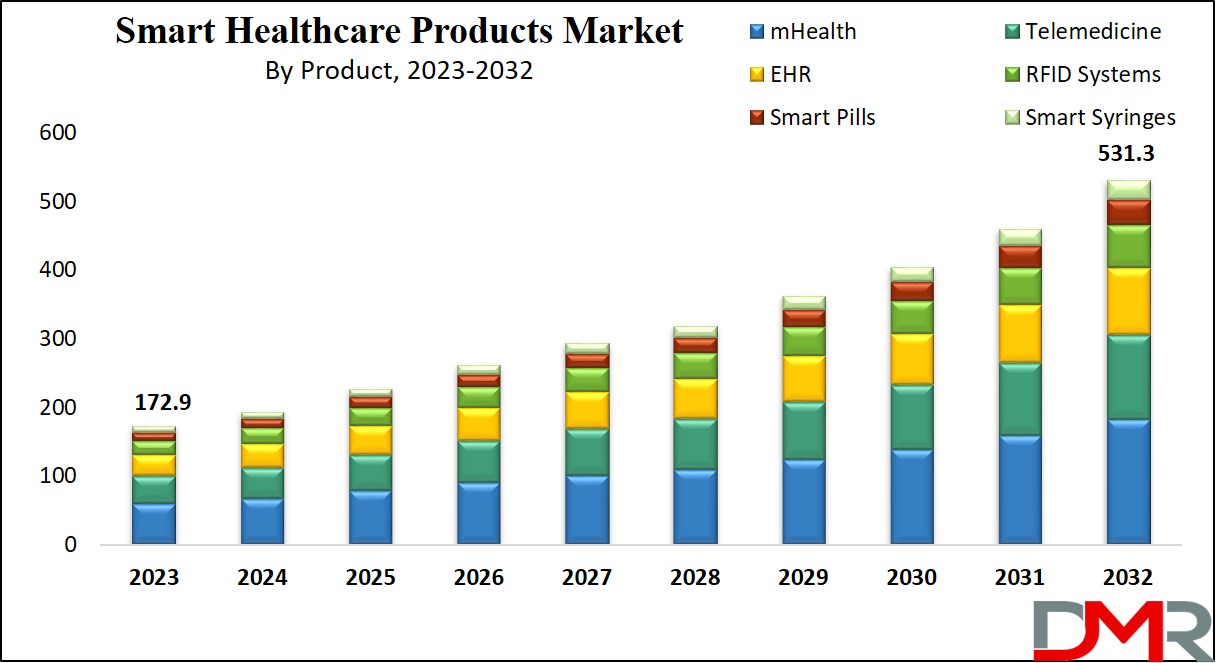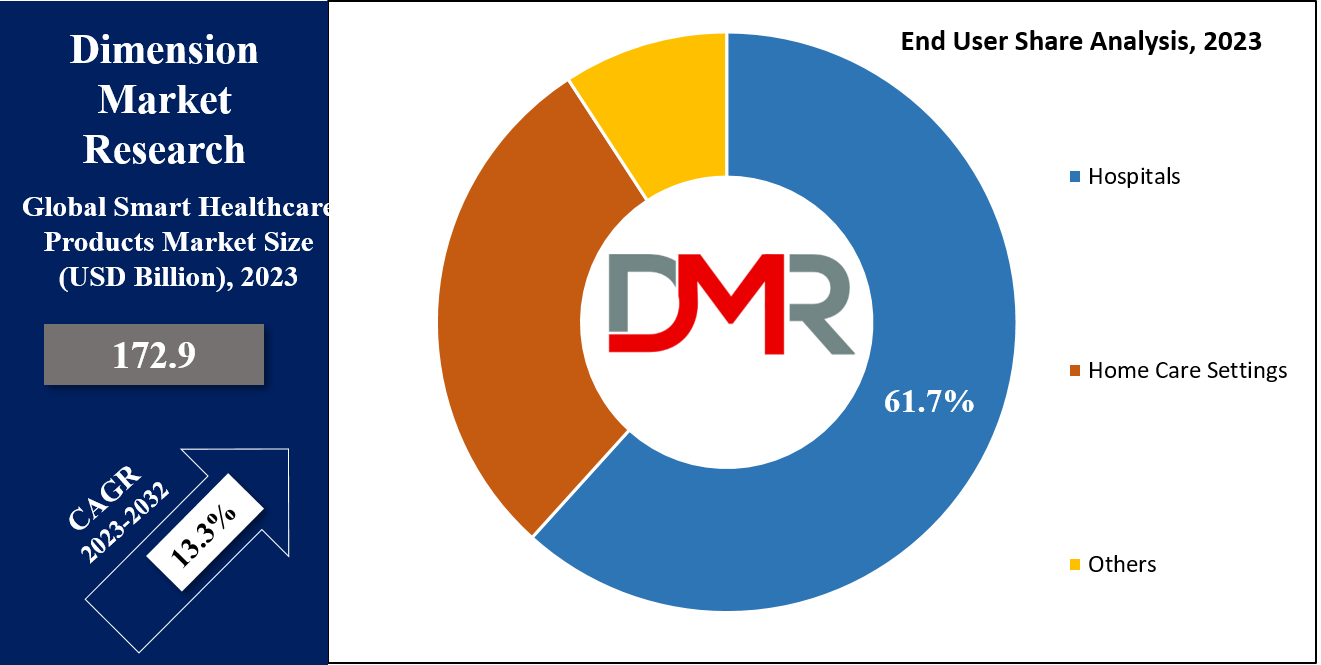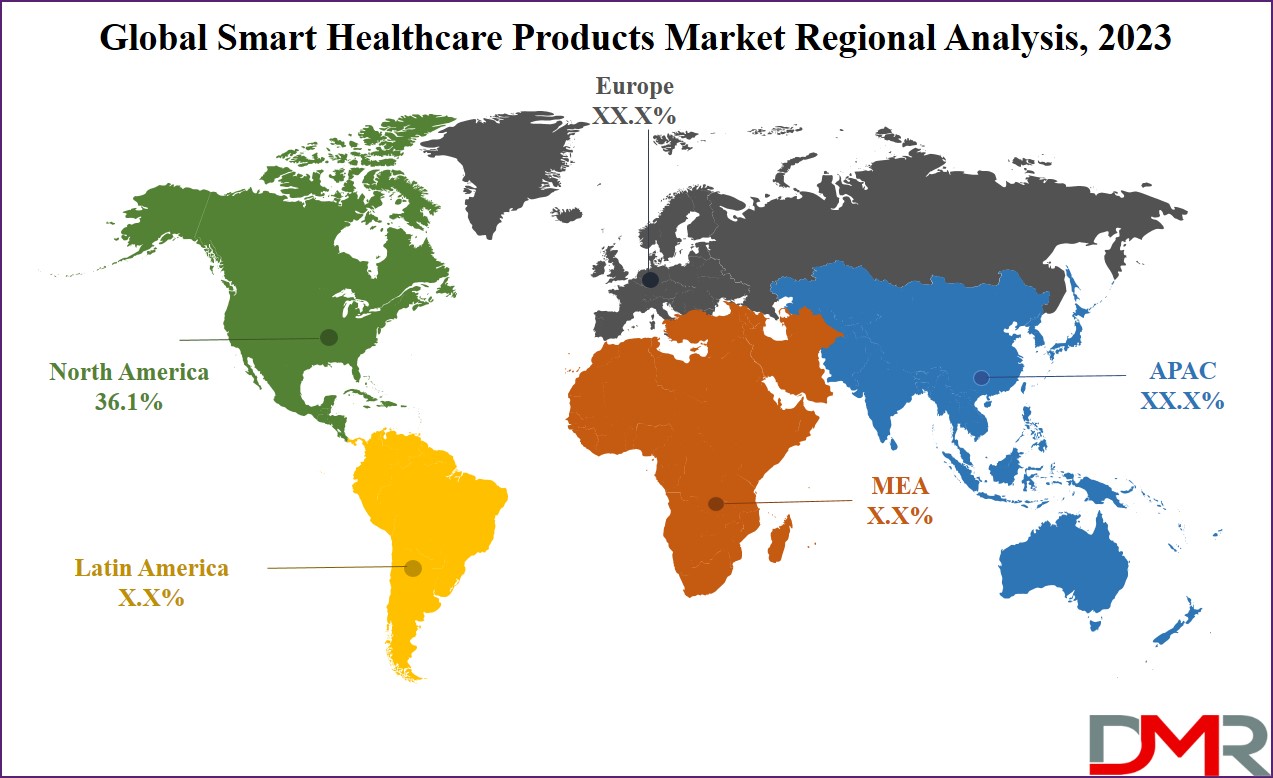Market Overview
The
Global Smart Healthcare Products Market is expected to reach a value of
USD 172.9 billion in 2023, and it is further anticipated to reach a market value of
USD 531.3 billion by 2032 at a
CAGR of 13.3%.

Smart healthcare products use advanced technology to improve patient care & overall well-being. These innovative tools assist clinicians in more effective patient treatment by providing accurate & relevant patient data, through advanced features, smart healthcare products contribute to enhanced healthcare outcomes & a better quality of life for individuals.
Market Dynamic
The smart healthcare market is set to grow, driven by the broad adoption of the Internet of Things (IoT). Over the forecast period, the quick integration of mHealth, government initiatives promoting healthcare digitization, & the increasing number of chronic diseases are expected to be significant growth drivers. Factors like an aging population, changing lifestyles, & additional governmental efforts in
healthcare digitization are expected to further boost market expansion. The growing demand for compact electronic devices for live data collection is also expected to play a crucial role in the market's development.
However, challenges in the form of the high cost of smart healthcare devices & high investment requirements, potentially hinder market growth. In addition, a shortage of qualified professionals may create a hurdle to the market's expansion.
Research Scope and Analysis
By Product
The mHealth segment takes center stage, dominating the smart healthcare products market in 2023, driven by the wide use of the internet, smartphone prevalence, & the increasing adoption of mHealth apps. The market is further positively influenced by the introduction of wearable devices by industry giants like Fitbit, Apple, and MI, contributing to the segment's continued growth.
Further, the RFID system emerges as the fastest-growing segment, fueled by trends like automation, supply chain management, real-time intelligence, & asset tracking. The technology's application in hospitals streamlines workflow, expediting patient movements & improving efficiency. In addition, RFID's integration into Real-Time Location Systems (RTLS) proves important for tracking newborns. As a result, this segment is expected for significant growth during the forecast period.
Also, Telemedicine appears as the second-fastest-growing segment, gaining momentum from the COVID-19 pandemic. The global emphasis on social distancing has accelerated the adoption of telemedicine by healthcare professionals, providing a secure and effective means of communication with patients, and further establishing virtual care delivery as a vital solution.
By End User
The smart healthcare products market caters to various end-users, such as hospitals, home care settings, and others, offering a range of technologies to enhance healthcare delivery and patient outcomes. In 2023 hospitals account for a significant share of the market, as the demand for smart healthcare products is on the rise, encompassing
electronic health record (EHR) systems, patient monitoring systems, clinical decision support tools, medical imaging devices, &hospital management software. These technologies focus on boosting operational efficiency, improving patient care coordination, ensuring accurate diagnosis & treatment, and streamlining healthcare workflows In the hospitals.

Further, the expanding popularity of remote monitoring &
telehealth is driving the adoption of smart healthcare products in home care settings, which includes wearable devices, remote patient monitoring systems, telehealth platforms, medication management solutions, & mobile health applications. These products enable patients to receive care at home, allowing healthcare providers to remotely monitor critical signs, conduct virtual consultations, & ensure adherence to medication regimens.
Smart Healthcare Products Market Report is segmented on the basis of the following:
By Product
- mHealth
- RFID Systems
- Telemedicine
- EHR
- Smart Pills
- Smart Syringes
By End User
- Hospitals
- Home Care Settings
- Others
Regional Analysis
North America dominates the smart healthcare products market in 2023,
contributing to 36.1% of the total revenue, which is fueled by supportive government policies, strong digital literacy infrastructure, & the presence of key market players. Further, factors like growing awareness about connected healthcare, broader internet & smartphone usage, along the popularity of health-related apps, further drive market growth in the region.
In addition, the Asia Pacific is expected to have major growth in the smart healthcare sector, as countries like China, Japan, Australia, & India stand out owing to their advanced healthcare IT infrastructure & increasing investments in smart healthcare technologies. Moreover, the region anticipates growth from government digitalization initiatives in emerging nations like China & India, supporting the adoption of digital healthcare solutions and expanding health services accessibility.

By Region
North America
Europe
- Germany
- The U.K.
- France
- Italy
- Russia
- Spain
- Benelux
- Nordic
- Rest of Europe
Asia-Pacific
- China
- Japan
- South Korea
- India
- ANZ
- ASEAN
- Rest of Asia-Pacific
Latin America
- Brazil
- Mexico
- Argentina
- Colombia
- Rest of Latin America
Middle East & Africa
- Saudi Arabia
- UAE
- South Africa
- Israel
- Egypt
- Rest of MEA
Competitive Landscape
The smart healthcare products market is in a phase of growth & features moderate competition, as key market players focus on introducing new products like cardiology & blood glucose monitors. Various companies have launched smart wearable devices, like health monitors, smartwatches, pedometers, & activity trackers. To strengthen their position, industry collaborations, mergers, acquisitions, & partnerships are some of the common strategies among companies in the smart healthcare products market.
In March 2022, Intuitive MB introduced an advanced medical building operating system, harnessing the Internet of Things (IoT), artificial intelligence (AI), & machine learning, which is designed to transform hospitals & medical office buildings into intelligent spaces. By integrating these advanced technologies, Intuitive MB aims to create a network of "smart" healthcare facilities, improving efficiency & patient care through the seamless coordination of different elements within the medical infrastructure.
Some of the prominent players in the global Smart Healthcare Products Market are:
- Abbott
- GE Healthcare
- Olympus Corp
- Samsung Healthcare
- Cerner Corp
- Epic Systems Corp
- Capsule Technologies
- Medtronic
- Solstice Medical
- Bollhoff Group
- Other Key Players
COVID-19 Pandemic & Recession: Impact on the Global Smart Healthcare Products Market:
The COVID-19 pandemic & the following economic downturn have significantly impacted the global smart healthcare products market, as the growing focus on remote patient monitoring & the need for contactless healthcare solutions during the pandemic has driven the adoption of smart healthcare products. However, economic uncertainties & budget constraints in the healthcare sector have impacted market growth.
The pandemic highlighted the importance of digital health technologies, leading to a growth in telehealth services & wearable devices. Despite the recessionary pressures, the smart healthcare products market is expected for long-term growth as healthcare systems prioritize innovation & efficiency to address ongoing challenges & enhance patient care in a fast-evolving landscape.
Report Details
| Report Characteristics |
| Market Size (2023) |
USD 172.9 Bn |
| Forecast Value (2032) |
USD 531.3 Bn |
| CAGR (2023-2032) |
13.3% |
| Historical Data |
2018 – 2023 |
| Forecast Data |
2024 – 2033 |
| Base Year |
2023 |
| Estimate Year |
2024 |
| Report Coverage |
Market Revenue Estimation, Market Dynamics, Competitive Landscape, Growth Factors and etc. |
| Segments Covered |
By Product (mHealth, RFID Systems, Telemedicine,
EHR, Smart Pills, and Smart Syringes), By End User
(Hospitals, Home Care Settings, and Others) |
| Regional Coverage |
North America – The US and Canada; Europe – Germany, The UK, France, Russia, Spain, Italy, Benelux, Nordic, & Rest of Europe; Asia- Pacific– China, Japan, South Korea, India, ANZ, ASEAN, Rest of APAC; Latin America – Brazil, Mexico, Argentina, Colombia, Rest of Latin America; Middle East & Africa – Saudi Arabia, UAE, South Africa, Turkey, Egypt, Israel, & Rest of MEA
|
| Prominent Players |
Abbott, GE Healthcare, Olympus Corp, Samsung
Healthcare, Cerner Corp, Epic Systems Corp, Capsule
Technologies, Medtronic, Solstice Medical, Bollhoff
Group, and Other Key Players |
| Purchase Options |
We have three licenses to opt for: Single User License (Limited to 1 user), Multi-User License (Up to 5 Users), and Corporate Use License (Unlimited User) along with free report customization equivalent to 0 analyst working days, 3 analysts working days and 5 analysts working days respectively. |